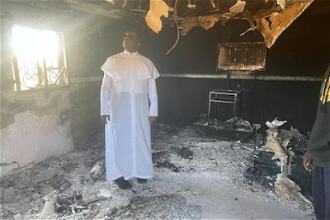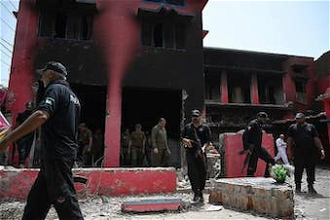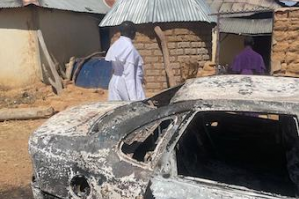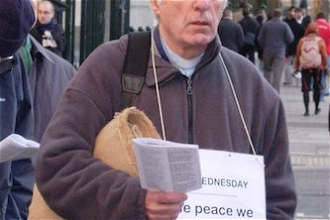Report questions whether Christianity can survive worst persecution ever recorded
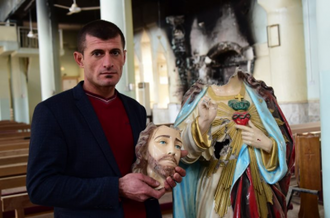
Christian holds statue beheaded by Daesh, St Addai Church, Keramlis, Iraq
The persecution of Christians is worse now than at any time in history, but is being largely ignored by the world, according to a new report launched by Aid to the Church in Need at a meeting chaired by Lord Alton, in the Houses of Parliament yesterday, 12 October. The report: Persecuted and Forgotten? concludes that the persecution of Christians reached a high water mark in 2015-17, with growing attacks on the faithful by Daesh (ISIS), Boko Haram, and other fundamentalist groups. At the beginning of the meeting, Lord Alton the announced that another Coptic priest had been murdered in Egypt that morning.
According to the report, the international community has failed to adequately respond to the needs of Christians attacked by militant extremists. It states that: "Governments in the West and the UN failed to offer Christians in countries such as Iraq and Syria the emergency help they needed as genocide got underway.
"If Christian organisations and other institutions had not filled the gap, the Christian presence could already have disappeared in Iraq and other parts of the Middle East," the report states.
Lord Alton said: "I wish aid sent by Christian organisations was matched by western governments."
Several speakers pointed out that although it was claimed that UN and international government funding was being sent to the region, there was little sign of it on the ground. Sister Annie Demejian, SJM, who works with families in Alleppo, Syria described desperate living condition where traumatised families have been surviving with no water or electricity and little food or medicines. "Syrian children have become victims of war waged by others," she said.
During the campaign of genocide by Daesh and other Islamist militant groups in the Middle East, Christians were disproportionately affected by the extremists.
In Iraq, more than half of the country's Christian population became internal refugees and Syria's second city of Aleppo, which until 2011 was home to the largest Christian community, saw numbers dropping from 150,000 to barely 35,000 by spring 2017 - a fall of more than 75 percent.
Despite national governments and international organisations having determined that a genocide has taken place, local Church leaders in the Middle East have repeatedly said that they feel forgotten by the international community.
Work resettling displaced Christians in the towns and villages they were driven out of by Daesh in northern Iraq was described by Father Salar Kajo, Vicar general of Alquosh, who helps oversee the programme returning displaced families to their homes on the Nineveh Plains. Fr Kajo said Christians were being treated as second class citizens. He expressed fears that if further fighting breaks out between the Kurds and Iraqis - "The Christians will disappear". He said that he had seen very international aid arrive - apart from that provided by the Church. "the Church is helping with rebuilding, providing water, generators, clinics… UNESCO came once and painted something and left."
A number of bishops in the region have accused the UN of overlooking the needs of displaced Christians, despite pledging to deliver aid 'neutrally and impartially.' Melkite Greek Catholic Archbishop John Darwish, from the Lebanon, which has been taking in refugees from different countries for over 50 years - since the Palestinians came with the establishment of the State of Israel - said that the huge influx of refugees was putting a great strain on the infrastructure of his country. He pointed out that for many centuries, Christians who have lived in the Lebanon since the time of Christ, were a very positive influence on society in the Middle East. He appealed for the west to stop funding immigration and instead to support Christians in their historic homeland.
Lord Alton said that many analysts describe what is happening to Christians in the Middle East today as a "slow continuation' of the Armenian Genocide. More than a hundred countries now are not honouring many of the articles in there Universal Declaration of Human Rights.
Persecuted and Forgotten? also identified growing problems in certain majority Islamic countries and authoritarian states such as Eritrea and North Korea.
Persecuted and Forgotten? found that members of China's 127 million-strong Christian population have suffered increased persecution following new attempts to bring Christianity in line with Communist ideals.
More than 2,000 churches and crosses have been pulled down in China's coastal Province of Zhejiang and clergy are still being routinely detained by authorities.
Extremism has been a growing problem in Africa, particularly in Nigeria where Daesh affiliates Boko Haram have displaced more than 1.8 million. Bishop Matthew Kukah from northern Nigeria spoke about Christians living with violence from Boko Haram and other extremist militants. In one diocese alone, Kafanchan, within five years, 988 people had been killed, and 71 Christian-majority villages had been destroyed, as well as 2,712 homes and 20 churches. A critical cause was lack of education, he said. "There are 15 million young people in northern Nigeria who are not receiving any education. As long as this situation continues many of them will become "cannon fodder for Boko Haram," he warned.
Report editor John Pontifex said: "In terms of the numbers of people involved, the gravity of the crimes committed and their impact, it is clear that the persecution of Christians is today worse than at any time in history. Not only are Christians more persecuted than any other faith group, but ever-increasing numbers are experiencing the very worst forms of persecution."
Although the report found in the countries under examination that many faith communities have suffered at the hands of extremists and authoritarian regimes, it concluded Christians have experienced the most hostility and violence. The report supports this claim with a series of examples showing the extent of the problems facing Christians in each of the 13 core countries it assesses in depth, as well as providing an overview of the state of religious freedom for the country's various denominations.
Aid to the Church in Need supports more than 5,000 projects in 140 countries. This autumn they are asking us once again, to stand in solidarity with persecuted Christians and all who suffer for their peacefully held beliefs. A week of events will be taking place from 19 – 26 November with #RedWednesday as the highlight on Wednesday 22 November.
For more information and films from yesterday's event, see: www.acnuk.org



